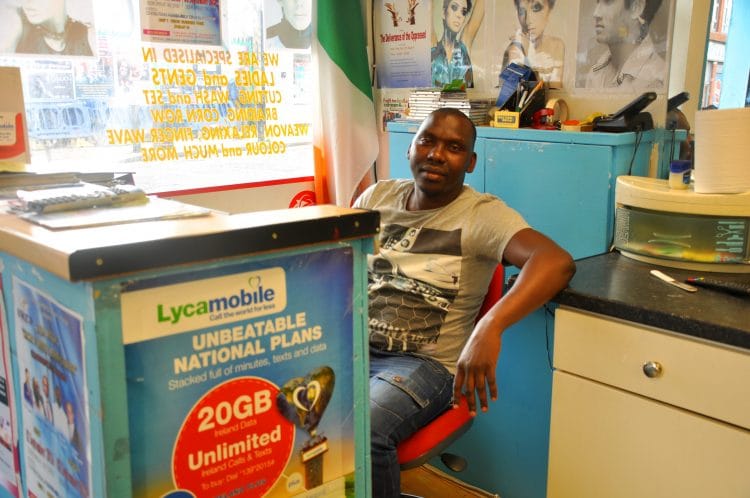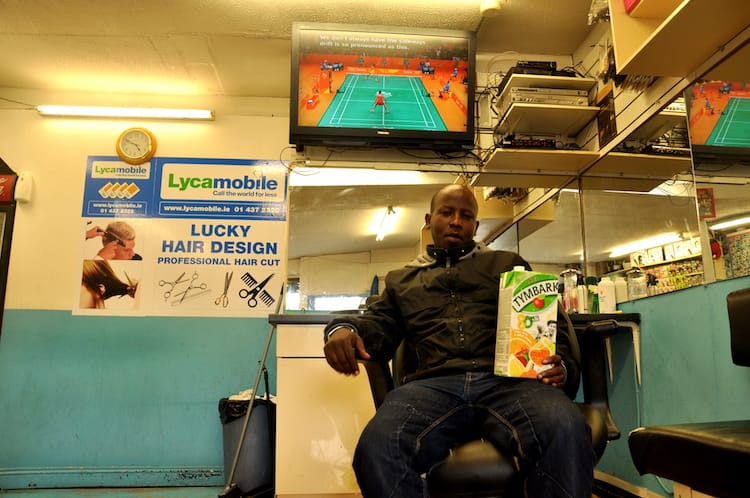What’s the best way to tell area residents about plans for a new asylum shelter nearby?
The government should tell communities directly about plans for new asylum shelters, some activists and politicians say.
At this Stoneybatter barber shop, men and boys with ties to Africa gather to share news, listen to music, talk football and get their hair cut.

It’s Saturday morning and Lucky Gaspard has a lot on his mind.
After a recent trip home to Burundi, he has a cold that he can’t seem to shake. The seats might need to be replaced in his barber shop and the painters still haven’t shown up to redo the outside walls.
But this is typically the busiest day of the week for Lucky Hair Design & Barber and with the Premier League kicking off this afternoon, he expects a lot of footfall.
On a corner of Stoneybatter where North King Street meets Blackhall Place, the door is wide open as if the shop were a continuation of the streets outside.
Inside has the relaxed, hospitable atmosphere of someone’s front room. The shelves are stacked to the ceiling with specialist products that promise to soften hair, or add texture and extra spring to curls.
There are posters and pamphlets advertising cheaper calls to Cameroon and a religious conference where the glory of Jesus Christ will be celebrated in a Clondalkin Business Park.
Curious passersby and tourists peer in, and throughout the day there is a constant flow of customers who stop by, sometimes just to chat, other times to also get a haircut.

A well-dressed couple, who look like as if they’re on their way to church, drop in so the husband can have a quick shave. A father and young son arrive wearing almost identical tracksuits, ready to spend the afternoon.
Often customers will come once a week. Some travel from as far afield as Belfast and Cork. They enter with a hearty “Bonjour!” and settle in for a couple of hours, often grabbing a cold drink from the fridge in the corner.
Alongside cans of Coca-Cola and Sprite, the fridge has rows of Old Jamaica Ginger Beer, Sun Exotic and Three Horses Malt Beverage, as well as an Irish Pride batch loaf. The room smells faintly of talcum powder and olive-oil scented conditioning spray.
Gaspard is happy to weigh in on any topic raised. He has an attentive but subtle demeanor, and his expression can switch quickly from grave to sunny.
Conversations run all at once, heaped on top of each other in different languages, accompanied by the ambient hum of hair clippers and Afro-gospel-pop from a single powerful speaker. The football gets underway, and the music volume is lowered and the large television in the corner is turned up.
A customer asks Willy, one of the four barbers in Lucky’s employ, to rotate his seat away from the mirror so he can watch the match while getting his haircut.
“He’s no star!” Gaspard tells Willy, as they discuss the merits of Paul Pogba and his move to Manchester United.
“He is!” Willy protests. “Pogba is a star player.”
“Ehh, he’s a lucky guy,” says his manager. “That [kind of] money is too much for nothing.”
As the conversation progresses it becomes clear that Gaspard is the more cynical one, particularly when the topic of their beloved Arsenal comes up.
“The time of Thierry Henry. The time of Vieira. They’ll never have [that again],” Gaspard says definitively. “That was Arsenal.”
“Come on!” says Willy.
“That was Arsenal,” says Gaspard.
As they talk, the barbers work. They take their time to style fades, darken beards with paintbrushes, and tidy eyebrows with straight razors.
A young boy with a fresh star shaved onto the side of his head leaps from his chair with a delighted look and runs to his father. During busy periods, there isn’t even time to sweep the clumps of hair from the floor.
A group of lads in soccer gear stick their heads in the door.
“What score is it?” asks a young guy in a Liverpool kit.
“One all,” I reply.
“One all,” he repeats. Then he turns to Gaspard. “Tomorrow. Liverpool against Arsenal!”
“Five euro?” says Gaspard.
“Five euro, yeah? I haven’t got it now but put it on the spot. If Liverpool win, you give me five euro. If Arsenal win, I’ll give you five euro.”
They shake on it. But Gaspard knows from experience that even if the Gunners succeed his chances of seeing that money are slim.
“Don’t change your mind,” he warns in a mock-serious tone.
“Positive,” replies the kid solemnly.
“Before, you told me five euro, you remember? You lost …”
“No! You remember I gave you the chips?”
“You gave me the chips but you didn’t give me five euro.”
Peter Vuite, who has just finished his shift in a supermarket, sits behind the counter as he waits to be seen. Each week, he visits the barbers for a shave. Each fortnight, he gets his hair cut. He’s been a regular since it first opened, and can remember when Gaspard took it over in 2008.
On Vuite’s days off, he’ll stay for two or three hours. For him, Lucky’s is somewhere to go after work when he doesn’t want to go home just yet.
“Some people just come to sit here and meet people,” he says. “We don’t have in our community something like that, where we can go.” It’s a place to gossip, to share news of Africa.
Vuite talks about a recent visit home to Angola, where he felt like an outsider, and could see how the political climate had stagnated. “I was born in 1976. The president has been there since 1979,” he says.
He has no plans to move, not that far anyway. “I love County Kildare. I’m thinking one day when I get a chance to get a place, I’d like if it could be in Kildare,” he says.

The match ends, and the afternoon rush passes, and the conversation dies down. In the shop, there is the lulling, repetitive snip of scissors cutting hair. Willy clips his own beard, as a young patron in a stonewashed denim jacket and distressed jeans waits for his turn.
Gaspard hops into a chair so the newest recruit can cut his hair. It takes a long time before his barbers are entrusted with anything more than the simplest haircuts so he scrutinises every move of the clippers.
It’s nearing the end of the day and the painters still haven’t turned up. Gaspard talks about the last time that the shop was repainted.
He had been on a trip back home to Burundi, and the shop front was smeared with graffiti using a racist insult and telling him to “go back home” to “fuck off” to “go back to your own country”.
“When people from city council [saw that] they were not happy,” he says. Gaspard said that he didn’t mind, but council officials said they did, that people would feel ashamed as they walked past. The walls were repainted a deep sky blue.
It doesn’t matter what was on the wall outside. Gaspard sees the shop as a space that can be liberating for local Africans.
“Sometimes people, they have stress. They don’t have a place to go,” he says. “They don’t want to go to the pub to drink. So they feel free when they’re here. They sit down with the others and they start to talk. They have that time to talk with people and forget what happened.”
Get our latest headlines in one of them, and recommendations for things to do in Dublin in the other.